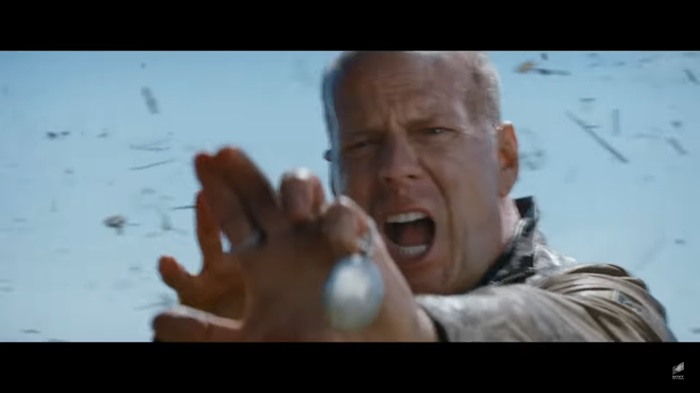Looper is a science fiction thriller film directed by Rian Johnson, released in 2012. The movie is set in a dystopian future where time travel exists but is illegal and only available on the black market. The film explores the ethical and moral consequences of time travel, and how it affects the lives of individuals involved in this dangerous and clandestine practice.
Plot Summary
The story is primarily set in the year 2044, where the world is characterized by social decay and organized crime. Time travel, although illegal, is employed by criminal organizations who send their targets 30 years back in time to be assassinated by specialized hitmen called "loopers."
Loopers
The protagonist, Joe, played by Joseph Gordon-Levitt, is one such looper. Loopers are contracted to kill targets sent back in time, and they are well-compensated for their services. However, there's a catch – eventually, each looper must "close the loop" by killing their future selves, thereby ending their contract and ensuring secrecy.
Conflict
The central conflict arises when Joe's older self, portrayed by Bruce Willis, is sent back in time for assassination. Unlike most targets, Old Joe manages to escape, creating a complex and intriguing situation. The film delves into the repercussions of Joe's attempt to confront and alter his future, leading to a series of events that challenge the conventional understanding of time and its consequences.
Sara and the Rainmaker

Another crucial element of the plot is the character Sara, portrayed by Emily Blunt, and her son Cid. Sara becomes entangled in the events when Joe seeks refuge on her farm. Cid is revealed to possess powerful telekinetic abilities, raising questions about the origin and significance of such abilities in the context of the film's universe.
The Rainmaker
As the narrative unfolds, it becomes apparent that Old Joe's mission is not just a personal one; it's driven by a desire to change the future and prevent the rise of a mysterious and powerful crime lord known as the Rainmaker. The Rainmaker is responsible for a series of events in Old Joe's timeline that he wishes to undo, and this adds a layer of complexity to the storyline.
Temporal Paradoxes
Looper skillfully navigates the complexities of time travel, introducing various temporal paradoxes and ethical dilemmas. The film explores the idea that attempting to alter the past can have unforeseen consequences and raises questions about free will, destiny, and the interconnectedness of actions.
Character Development
Joe's Transformation
Throughout the film, Joe undergoes significant character development. Initially motivated solely by self-preservation and a desire for wealth, he is forced to confront deeper ethical questions as the narrative progresses. His interactions with his older self and Sara challenge his worldview, leading to a transformation that goes beyond the typical arc of a sci-fi action protagonist.

Old Joe's Motivations
Old Joe, on the other hand, is a more complex character driven by a mix of regret, vengeance, and the desire to create a better future. His relentless pursuit of the Rainmaker adds a layer of intensity to the plot, and the moral ambiguity of his actions becomes a central theme.
Sara and Cid
Sara's character adds emotional depth to the story. Her connection with Joe, the mysterious circumstances surrounding Cid's abilities, and the impact of time travel on their lives contribute to the film's exploration of human relationships and the consequences of one's choices.
Climax
Showdown
The climax of Looper builds up to a suspenseful showdown involving Joe, Old Joe, and the looming threat of the Rainmaker. The converging timelines and conflicting motivations come to a head, leading to a tense and action-packed sequence that showcases the film's blend of science fiction and thriller elements.
Confrontation with the Rainmaker
The confrontation with the Rainmaker is a pivotal moment, providing answers to lingering questions about the nature of Cid's abilities and the significance of the Rainmaker's rise to power. The film explores themes of determinism and the potential for change, even in the face of seemingly inevitable futures.
Looper Ending Explained
The ending of Looper is a culmination of intense events, ethical dilemmas, and a resolution that involves sacrifice and a break from the cyclical nature of time loops.
As the narrative reaches its climax, Joe (Joseph Gordon-Levitt) and Old Joe (Bruce Willis) find themselves in a final confrontation, both physically and ideologically. The looming threat of the Rainmaker, a powerful crime lord in the future, adds urgency to their clash.
The setting is a remote location, and the stakes are high. Old Joe is determined to eliminate the Rainmaker as a child to prevent the future crimes that shaped his own life. On the other hand, Joe, having undergone significant character development throughout the film, realizes the potential for change and seeks an alternative path.
The pivotal moment comes when Old Joe identifies a child named Cid as the Rainmaker. Cid is under the care of Sara (Emily Blunt), who has been harbouring Joe. The ethical dilemma intensifies as Old Joe is ready to kill Cid to eliminate the future threat, while Joe, now emotionally invested in Sara and Cid, hesitates.
Sara's character, with her maternal instincts and a protective stance toward Cid, adds an emotional layer to the resolution. The film skillfully blends action with these emotional undercurrents, creating a tense and gripping atmosphere.
In a decisive moment, Joe realizes that the cycle of violence must be broken. He makes a sacrificial choice to prevent Old Joe from carrying out his mission. The resolution involves a poignant and unexpected turn of events, subverting the expectations of a conventional sci-fi thriller.
The film concludes with a reflection on the consequences of the characters' actions. It offers closure to the temporal paradoxes introduced earlier in the plot and provides a sense of resolution. The cyclical nature of time loops is addressed in a way that feels both satisfying and thematically resonant.
Looper doesn't provide a neat and tidy ending but leaves room for contemplation. The philosophical implications of the choices made by the characters linger, encouraging viewers to reflect on themes of free will, destiny, and the potential for change within the constraints of time.






